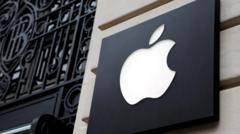In a significant legal turn, Apple Inc. is facing a potential criminal contempt investigation following a ruling by U.S. District Judge Yvonne Gonzalez Rogers. The judge determined that the tech giant willfully violated her injunction related to a prominent antitrust case initiated by Epic Games, the developer behind the widely popular game Fortnite. During the proceedings, Judge Rogers accused an Apple executive of "outright lying" under oath.
The original injunction was crafted to prevent Apple from engaging in anti-competitive practices and restrictive pricing, thereby mandating that the App Store should allow alternative payment options. In her ruling, Judge Rogers expressed her intent to refer the case to the U.S. Attorney for the Northern District of California to evaluate the appropriateness of commencing a criminal contempt proceeding against Apple.
Apple's response to the court's decision came swiftly, with a spokesperson stating, "We strongly disagree with the decision. We will comply with the court's order and we will appeal." This case dates back to a 2021 lawsuit from Epic Games, which argued that Apple’s App Store policies are monopolistic and that developers should be permitted to offer third-party payment options to consumers without facing exorbitant commission fees, sometimes reaching 30%.
Judge Rogers indicated that Apple has continued to undermine competition despite her 2021 judgement, which stipulated that developers must be allowed to link to their own purchasing systems. Using a movie-streaming service as an analogy, she pointed out that developers could instruct customers to subscribe directly via their websites rather than through Apple’s in-app purchasing.
In a contempt order issued recently, Judge Rogers found sufficient evidence suggesting that Apple deliberately violated the injunction. Internal documents reviewed by the judge indicated that the company was fully aware of its actions and consistently opted for the most anticompetitive solutions. The judge noted a specific instance where Apple decided to impose a 27% commission on off-app purchases, compared to previously not charging anything.
Further complicating Apple's legal troubles, Judge Rogers highlighted that CEO Tim Cook disregarded advice from executive Phillip Schiller regarding compliance with the injunction. Instead, Cook was persuaded by CFO Luca Maestri to continue the company's problematic practices. The judge did not overlook the behavior of Apple’s vice president of finance, Alex Roman, who she claimed lied during his testimony.
Amid this tumultuous situation, Epic Games’ founder and CEO Tim Sweeney took to social media to announce plans for Fortnite’s return to the U.S. iOS App Store next week, while extending a proposal to Apple. Sweeney suggested that if Apple extends the court's favorable terms worldwide, Epic Games would reinstate Fortnite and cease all related legal disputes. In his assertive remarks, Sweeney declared, "NO FEES on web transactions. Game over for the Apple Tax," referring to Apple’s controversial fees as "junk fees" which he asserts are now rendered unlawful in both the U.S. and Europe under the Digital Markets Act.
The original injunction was crafted to prevent Apple from engaging in anti-competitive practices and restrictive pricing, thereby mandating that the App Store should allow alternative payment options. In her ruling, Judge Rogers expressed her intent to refer the case to the U.S. Attorney for the Northern District of California to evaluate the appropriateness of commencing a criminal contempt proceeding against Apple.
Apple's response to the court's decision came swiftly, with a spokesperson stating, "We strongly disagree with the decision. We will comply with the court's order and we will appeal." This case dates back to a 2021 lawsuit from Epic Games, which argued that Apple’s App Store policies are monopolistic and that developers should be permitted to offer third-party payment options to consumers without facing exorbitant commission fees, sometimes reaching 30%.
Judge Rogers indicated that Apple has continued to undermine competition despite her 2021 judgement, which stipulated that developers must be allowed to link to their own purchasing systems. Using a movie-streaming service as an analogy, she pointed out that developers could instruct customers to subscribe directly via their websites rather than through Apple’s in-app purchasing.
In a contempt order issued recently, Judge Rogers found sufficient evidence suggesting that Apple deliberately violated the injunction. Internal documents reviewed by the judge indicated that the company was fully aware of its actions and consistently opted for the most anticompetitive solutions. The judge noted a specific instance where Apple decided to impose a 27% commission on off-app purchases, compared to previously not charging anything.
Further complicating Apple's legal troubles, Judge Rogers highlighted that CEO Tim Cook disregarded advice from executive Phillip Schiller regarding compliance with the injunction. Instead, Cook was persuaded by CFO Luca Maestri to continue the company's problematic practices. The judge did not overlook the behavior of Apple’s vice president of finance, Alex Roman, who she claimed lied during his testimony.
Amid this tumultuous situation, Epic Games’ founder and CEO Tim Sweeney took to social media to announce plans for Fortnite’s return to the U.S. iOS App Store next week, while extending a proposal to Apple. Sweeney suggested that if Apple extends the court's favorable terms worldwide, Epic Games would reinstate Fortnite and cease all related legal disputes. In his assertive remarks, Sweeney declared, "NO FEES on web transactions. Game over for the Apple Tax," referring to Apple’s controversial fees as "junk fees" which he asserts are now rendered unlawful in both the U.S. and Europe under the Digital Markets Act.




















